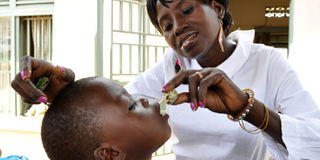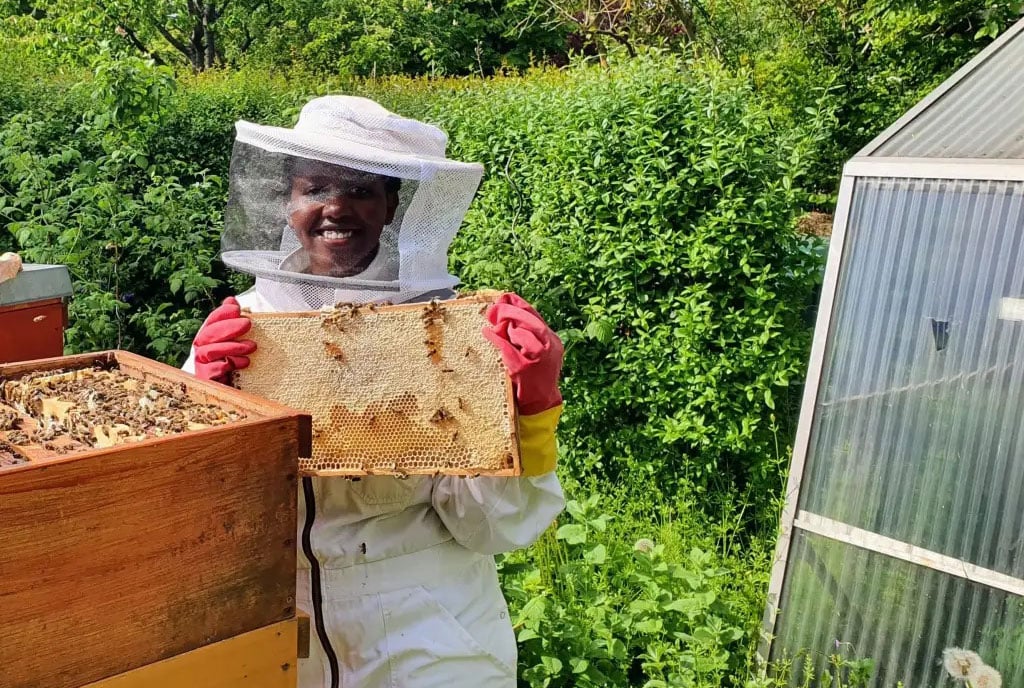How living with sickle cell changed my life

Prossy Nabirye Owalu administers medication to one of the patients at Mulago Sickle cell clinic. PHOTO by Rachel Mabala
What you need to know:
Prossy Nabirye is a volunteer counsellor at the Sickle Cell Clinic in Mulago National Referral Hospital. She has lived with the disease for 37 years. She shares her story of acceptance and how she is now trying to change the perceptions about people who have sickle cell anaemia.
My name is Prossy Nabirye Owalu. I am the third born of eight girls. I am married to Tony Owalu. We have two children. I learnt I had sickle cell at the age of five, during a conversation between my mother and a friend.
“Prossy falls sick frequently because she has sickle cell anaemia. That is how people with sickle cells are,” my mother would say. The fact that I was always sickly, experienced pain all the time and yet my siblings barely complained of an illness was another indicator that something was wrong with me.
I am the only one who has sickle cell out of the eight children.
Three of my siblings are carriers, while the other four have no trace of the disease. When I got to know about my condition, life went on as usual until Primary Two, when one girl in my class walked up to me and asked, “Prossy what ailment are you suffering from?” I told her sickle cell. Then she continued, “I heard my mother say children who suffer from sickle cell die by the age of 12.” This statement was a blow to me and tore me to pieces. I lived waiting for my 12th birthday to die, but I did not tell my family members about it.
The 12th birthday
On my 12th birthday, I refused to go to school and stayed at home with the maid. I knew I was going to die and I did not eat at all. We had a suitcase for clothes we particularly wore on Christmas Day. I got out the dress I wore the previous Christmas, lay straight on my bed and waited to die.
No one had cared to find out why I refused to attend school that day, and mother was busy most of the time. When my sisters returned and found me in my Christmas Day dress, they laughed but I just stayed on the bed. When my mother returned, she asked why I had not gone to school. I told her what had led me to do so.
Denying reality
In secondary school, I hid the fact that I had sickle cell from students, and did not want anyone to find out about it. Once I got an attack and ended up in hospital. The whole school found out about my illness. It was later at the age of 17, that I decided to stop keeping my condition to myself because I was missing opportunities of getting help from my colleagues.
An incident happened with my first boyfriend.
I had not told him about my condition when I got a sickle cell pain crisis that caused me to limp. When he inquired why I was limping, I told him I had fallen while wearing high heeled shoes. He went and bought me five pairs of flat shoes.
As time went by, I came to accept I was going to live with sickle cell for the rest of my life, and there was nothing I could do to change the situation.
I was tired of hiding and started to inform people around me about my condition.
I studied a Bachelor’s degree in Business Administration at Makerere University Business School (MUBS), Nakawa, but I have always had a passion to work with and counsel vulnerable groups. This passion led me to start counselling people with sickle cell at Mulago hospital.
In 2004, a group of health experts came from Jamaica to train us for two weeks on how to handle sickle cell conditions.
Finding love
I met Tony Owalu at a wedding meeting for one of the people living with sickle cell disease at Mulago hospital. Owalu was the treasurer at the wedding meeting, and I was the secretary. Since I had records of all items required for the wedding and he had the money, we were tasked to do the shopping.
At that time, I was renting out a big house on Mawanda Road in Kamwokya, a Kampala suburb to some white visitors to Uganda.
I had told Tony about them. I took him to the house to meet them, left them in the sitting room then went to my room. Tony was with them for a while, before joining me in my room. I realised he was interested in me.
Tony knew I had sickle cell from the start, because I had introduced myself during the wedding meetings. He had no problem with my health condition and after dating for some time, he proposed marriage. We have now been blessed with two children, Precious and Tevin.
Coping mechanisms
There are several things that a person living with sickle cell anaemia should keep away from.
Malaria, dehydration, cold, stress anxiety or excitement and fatigue. I use these five guidelines and I have taken a long time without suffering crisis attacks. When one gets this crisis, their red blood cells get clogged, thereby causing pain.
I take chloroquin every Tuesday, to avoid catching malaria. An option to chloroquine is taking Fansidar. I also take folic acid to keep my red blood cells strong. I also eat fruits and vegetables every day. When I was younger and got an attack crisis, my siblings would take turns to massage the area with clogged cells. A warm cloth can also be applied to the area.
The last pain crisis I suffered was in 2005. It was painful and I cried but despite all this pain, the consolation one has is that the pain is not in the chest because when one gets such a painful crisis in the chest, chances of dying are high.However, there is a vaccine called pneumococcal, that helps prevent the painful crisis in the chest.
Myths
Misconceptions people have about sickle cell have only worked to create stigma. Some people still believe people with sickle cell die by the age of 12, and that they cannot give birth, yet many have grown old have children.
The future
I am 37, and proud about it. I am waiting to see my grandchildren. I am grateful to God I have children and that I am still alive. I am also grateful I can read and write since most people with sickle cell are rarely granted a chance at school on assumption they will soon die.
I look forward to the day we shall get a sickle cell ward at Mulago hospital. We only have a clinic at the moment, and it closes at 4pm every day, yet we get at least seven new patients every day.




